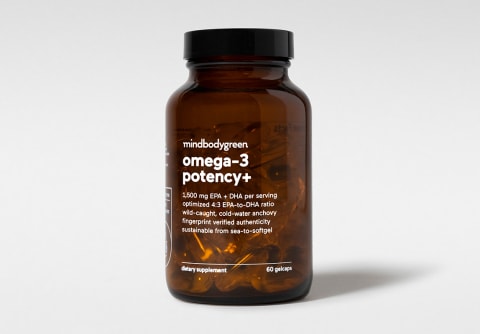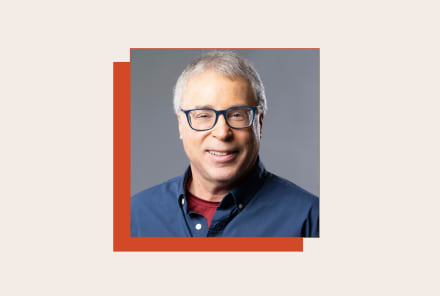Advertisement
5 Myths We've Busted On Omega-3s That Even We Were Surprised To Find Out


Ashley Jordan Ferira, Ph.D., RDN is Vice President of Scientific Affairs at mindbodygreen. She received her bachelor's degree in Biological Basis of Behavior from the University of Pennsylvania and Ph.D. in Foods and Nutrition from the University of Georgia.

Colloquially, omega-3s are best known as amazing healthy fats with incredible benefits (for the cardiovascular system, in particular).* But we believe that omega-3s are far more comprehensive than they get credit for—especially eicosapentaenoic acid (EPA) and docosahexaenoic acid (DHA).
The Global Organization for EPA and DHA Omega-3s1 (GOED) agrees, which is why they celebrated Global Omega-3 Day™ yesterday on March 3 (03-03) and since "O3" is short for "omega-3" (get it: O3-O3 for EPA plus DHA), to spread awareness about the vast health benefits these marine omega-3s offer.*
"More than 95% of Americans and 80% of people worldwide have low levels of EPA and DHA omega-3s," explains GOED's director of consumer and health care practitioner communications Elana Natker, M.S., R.D. "As a global organization representing companies all along the omega-3 supply chain—from fisheries to finished products, we decided to create a single day to get the word out on the need to increase people's awareness and intake of EPA and DHA omega-3s."
In honor of spreading awareness on the heels of Global Omega-3 Day™, we're breaking down five common myths so you, too, can amp up your omega-3 intake and celebrate these fatty acids—today and every day!
Myth 1: Omega-3s only support heart health.
The association between omega-3s and cardiovascular health is a strong one, but the heart is truly just the tip of the iceberg when it comes to omega-3 health benefits.* The fact is omega-3s support your brain, eyes, joints, and more in massive ways.*
When it comes to the eyes, DHA plays a huge role in retinal health and function2.* In addition to aiding vision development in infants in a big way, DHA is the reason you're able to see (and process what you're seeing) clearly3, and it helps maintain this optimal visual acuity throughout your life.* Omega-3s also combat eye dryness by providing oils to the tear film and increasing overall moisture.*
Since the eyes and brain work together constantly, it shouldn't come as a surprise that omega-3s (and yes, DHA especially) promote cognitive function in a variety of ways.* DHA is involved in everything from strengthening general neuroprotection and the brain's inflammatory4 and immune responses to supporting working memory, verbal learning5, and mental acuity throughout the lifespan6.*
Additionally, omega-3s support musculoskeletal health7, joint health and mobility8, and even longevity.* The benefits don't end at the heart!
Myth 2: Healthy people don't need to worry about their omega-3s.
No matter who you are or what your health looks like, you need to make sure you're getting enough omega-3s on a daily basis to support your whole-body health (I mean, you saw that long list of benefits that omega-3s deliver, right?).*
Statistically speaking, unless you're eating salmon or tuna every day or are already taking a high-quality daily omega-3 supplement, it's likely you need more EPA and DHA in your life. (Don't worry, you're not alone.)
Myth 3: Fish oil thins your blood.
While we've already addressed this myth in its own article (which you can read here), it's such a drastic misconception that it deserves a spot on this list as well. If you aren't already familiar with this old wives' tale, its origin story goes something like this:
Decades ago, the link between omega-3s and platelets (cell fragments in blood responsible for clotting) was established and concerns of fish oil's blood-thinning capabilities were wildly over-exaggerated and generalized to all fish oil and all doses.
As mbg's vice president of scientific affairs Ashley Jordan Ferira, Ph.D., RDN, has previously explained, this fishy myth is scientifically ridiculous. "The fact is, a quick look at the body of epidemiologic and clinical trial research9 over the past 30 years demonstrates, from multiple systematic reviews and meta-analyses, that there is, in fact, no increased risk for bleeding when people consume a total daily amount of EPA + DHA as low as 500 milligrams and as high as 10 grams (10,000 milligrams!)," she says. So, there you have it: At normal (and useful!) fish oil doses like 1 gram of EPA plus DHA daily, this myth is, well, fishy.
Myth 4: Vegans and vegetarians can't get omega-3s unless they eat fish.
To be fair, this myth has been concocted from some accurate (at times, confusing) science. Let us explain:
There are three main omega-3s: ALA (aka alpha-linolenic acid), EPA, and DHA. While ALA is found in plants, the marine omega-3s have more published clinical science to their name and also happen to be found primarily in fish. Now, a small portion of ALA can convert to EPA and DHA, but the process is insanely inefficient and variable.
But if you're a vegan, vegetarian, or even someone who just doesn't like eating fish, we're here to tell you it isn't impossible to increase your intake of all three omega-3s.
Fish actually get their EPA and DHA from algae, and we can do the same, although algal omega-3 oils are often slanted much on the DHA side of things. Of course, on the ALA front, you might immediately think of flaxseeds, chia seeds, walnuts, and the like. A less famous plant that's packed with ALA (and trace amounts of EPA) is purslane—an edible weed that can be added to salads, tacos, sandwiches, and other plant-based foods the same way you might top a dish with microgreens or sprouts.
Upping your intake of omega-3 foods and introducing a fish-free omega-3 supplement to your daily routine is a great way to meet your omega-3 needs on a vegan or vegetarian diet.
Myth 5: All omega-3 supplements are created equal.
If the other myths have encouraged you to start shopping for an omega-3 supplement, be prepared to do some thorough research and read a lot of labels. While there are a myriad of omega-3 supplements on the market, finding one that is truly high-quality can be quite the challenge.
Ferira recommends you look for a pure, bioavailable, and traceable omega-3 source that's sustainably sourced and delivered in a potent dosage (i.e., add up the total amount of EPA + DHA on the nutrition label, and look for 1,000 mg or more), with a short list of other ingredients, from a reputable company, of course.
(Psst: When in doubt, mbg's omega-3 potency+ delivers on all these criteria and more.)
The bottom line.
There are a lot of misconceptions out there about omega-3s, but their incredible benefits are undisputed. Whether you're looking to add more omega-3-rich foods to your diet or are beginning your search for the perfect omega-3 supplement, we hope these myth-busters help you ultimately meet your omega-3 needs!
9 Sources
- https://goedomega3.com/
- https://www.ncbi.nlm.nih.gov/labs/pmc/articles/PMC7601701/
- https://www.sciencedirect.com/science/article/abs/pii/S1350946204000527?via%3Dihub
- https://www.ncbi.nlm.nih.gov/labs/pmc/articles/PMC3257651/
- https://pubmed.ncbi.nlm.nih.gov/22250656/
- https://www.cambridge.org/core/journals/nutrition-research-reviews/article/dietary-dha-and-health-cognitive-function-ageing/1DC26922C905D4C150EF21282C9AA054
- https://www.ncbi.nlm.nih.gov/labs/pmc/articles/PMC3899785/
- https://www.ncbi.nlm.nih.gov/labs/pmc/articles/PMC4965662/
- https://www.ncbi.nlm.nih.gov/labs/pmc/articles/PMC4170890/
Watch Next
Enjoy some of our favorite clips from classes
Enjoy some of our favorite clips from classes
What Is Meditation?
Mindfulness/Spirituality | Light Watkins
Box Breathing
Mindfulness/Spirituality | Gwen Dittmar
What Breathwork Can Address
Mindfulness/Spirituality | Gwen Dittmar
The 8 Limbs of Yoga - What is Asana?
Yoga | Caley Alyssa
Two Standing Postures to Open Up Tight Hips
Yoga | Caley Alyssa
How Plants Can Optimize Athletic Performance
Nutrition | Rich Roll
What to Eat Before a Workout
Nutrition | Rich Roll
How Ayurveda Helps Us Navigate Modern Life
Nutrition | Sahara Rose
Messages About Love & Relationships
Love & Relationships | Esther Perel
Love Languages
Love & Relationships | Esther Perel


















